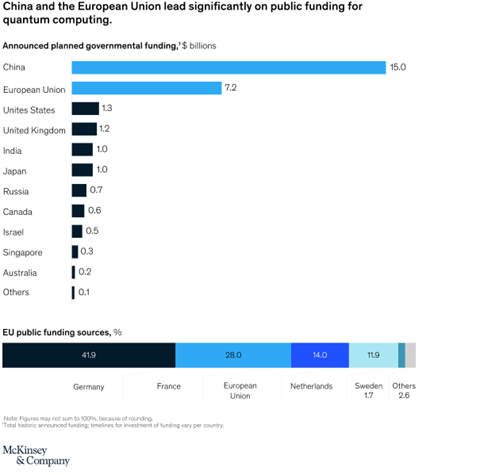
In recent years, emerging technologies have become prominent. Amongst them, quantum computing has a singular potential to change our world the most. Quantum computing has shown promising evidence to speed up heuristic computations in an incredible manner. Thus, applying quantum computing within complex solutions to address problems in pharmaceuticals and materials discovery, finance, autonomous vehicle applications, artificial intelligence, and other areas will have a significant impact on our lives. In particular, quantum computing has the potential to magnify the effects (both positives and negatives) of many AI applications.
As organizations work to become more digital, keeping upcoming technology transformations in mind is critical for better planning and strategy. Thanks to these technological advances, companies may reap real gains from quantum computing. With that in mind, let’s explore 10 things you should be aware of when it comes to the worlds of quantum computing and AI.
1. Main Characteristics of Quantum Computing
In so-called classical computers, bits are programmed as data units with possible values of ones and zeros. In quantum computers, data units are programmed with quantum bits—qubits—which can represent a one, a zero, or a combination of both zero and one at the same time.
A good analogy is a light switch, which in classical computers can have an on or off position. With qubits in quantum computers, the switch can have any spectrum of positions from the on through the off at the same time. The physical capability of the qubits brings to bear the two main characteristics of quantum computing.
- Superposition. This refers to the ability of qubits to be both on and off at the same time, or somewhere on a spectrum between the two. This uncertainty and probability baked into the data unit makes the system powerful in solving certain types of problems.
- Entanglement. This is the ability of qubits linked together to affect each other’s independence even if they are physically separate. As such, if we have two qubits and one’s position is changed, the other is affected even if the qubits are separated. This characteristic lends a powerful capability of moving information around at incredibly high speeds.
2. Faster and Better
Quantum computers have four fundamental capabilities that differentiate them from today’s classical computers:
- Prime factorization leveraging multidimensional spaces to explore large problem spaces and could revolutionize encryption.
- Optimization by solving large/complex problems with unprecedented speed.
- Simulation, in which quantum computers models complex problems effectively.
- Quantum artificial intelligence with better algorithms that are faster and more accurate. IBM’s quantum research team has found that entangling qubits on the quantum computer that ran a data-classification experiment cut the error rate in half compared to unentangled qubits.
Applications in business will address problems that are complex. For example:
- Pharmaceutical development requires substance molecule modelling that is notoriously difficult because atoms in molecules interact with other atoms in complex ways. The inherit entanglement property of quantum computers lends itself here quite well.
- Leveraging quantum AI to speed up the time and accuracy for training systems such as those in autonomous vehicles.
From financial services, pharmaceuticals and medical products, healthcare, energy, telecom, media, travel, logistics, and insurance to name a few, there are a number of industries that will all benefit significantly from quantum computing.
3. Bias Amplifier
Quantum computing’s amplifying effect goes beyond speed and accuracy. It also highlights the baked-in bias that exists within AI/ML models. As such, applications that are vulnerable to algorithmic bias (e.g., in the employment screening space, policing, etc.) may become even more so. In other words, quantum computing may have a magnifying negative side effect that could render such applications too risky to use absent special mitigating controls. This is an unintended effect that anyone working with AI/quantum computing must recognize and account for in their solutions.
4. Increased Algorithmic Complexity, Transparency and Explainability
A current core issue with AI is its lack of transparency and explainability, especially when complex algorithms such as deep learning are leveraged. If an AI system is being utilized for decisions that directly impact lives, such as courtroom decisions, social benefits to communities, or even deciding who gets a loan and at what rate, it is fundamentally critical that the decision can be tied to tangible facts that are non-discriminatory in practice.
Understandably, quantum computing on such AI systems increases the complexity which correlates with transparency and explainability adversely.
5. A New Cryptographic Standard
A key drawback of this wonderful technology is its ability to crack many of the defenses used to secure the internet and other critical applications. Quantum computing poses a serious threat to the cybersecurity systems relied on by virtually every company. Most of today’s online-account passwords and secure transactions and communications are protected through encryption algorithms such as RSA or SSL/TLS. The current standard relies on the complexity in factoring large numbers into primes. However, this is a type of problem quantum computers are great at solving. Breaking a password with our current standards would take a classic computer 100 years but can be accomplished in a matter of seconds with a quantum computer. This impact goes beyond personal account passwords—it includes laying bare private communications, company data and even military secrets. To counter this, the US National Institute of Standards and Technology (NIST) is spearheading a global effort to find post-quantum cryptography algorithms that will be fast and trustworthy. Dustin Moody, a NIST mathematician working on the effort, said at an IBM cryptography meeting, “We hope to have the final version completely ready and published around 2024.”
6. Not a Replacement for Current Computers
Classical computers are better at some tasks than quantum computers (email, spreadsheets and desktop publishing to name a few applications). The intent of quantum computers is to be a different tool to solve different problems, not to replace classical computers. So yes, we’ll still have computer systems as we know it, or a version of it like we currently know, for the foreseeable future.
7. Approaching Mainstream
Quantum technology breakthroughs continue to accelerate, investment is flowing in, and startups in the quantum computing space continue to multiply. Big tech companies such as Alibaba, Amazon, IBM, Google, and Microsoft have already launched commercial quantum-computing cloud services.
Although quantum computing as a concept has been around since the early 1980s, the first real proof that quantum computers could handle problems too complicated for classical computers occurred only in late 2019, when Google announced that its quantum computer had solved such a calculation in only 200 seconds. Goldman Sachs recently announced that it could introduce quantum algorithms to price financial instruments in as soon as five years. Honeywell anticipates that quantum will form a $1 trillion industry in the decades ahead.

8. It Is Not Right Around the Corner
Although significant progress has been made on building different quantum computing systems, we are not close to having one in every organization—let alone in every household. Belying the quantum computing startups that have raised hundreds of millions of dollars, there is no expectation quantum computing systems becoming an everyday standard in the next five years. This delay is largely due to the difficulties that still persist, including the difficulties to engineer, build, and program quantum computing systems, including noise, faults, loss of quantum coherence, and of course the high price tag associated with quantum computing systems.
9. Semiconductor Chips and Talent Needed
The pandemic brought about key changes in the way we live, including work from home normalization, supply chain disruptions, and suspicious looks to anyone that coughs near you. It also highlighted the high demand but low supply of semiconductor chips. From technology devices to vehicles, increased demand has impacted consumer prices significantly. With the advent of quantum computers, demand will only grow further, impacting the availability and cost of semiconductors correspondingly. Beyond the hardware supply limitations, there are not yet nearly enough resources trained to support quantum computing systems and the economic ecosystem at large.
10. Related Quantum Computing Advances
Recent years have seen computing advance in two major ways—breakthroughs in machine learning to develop algorithms that improve automatically through experience, and research into quantum computers that can theoretically prove more powerful than any supercomputer.
- Quantum memristor. Scientists have created the first prototype of a device known as a quantum memristor, which might help bring together the best of both of those worlds—combining artificial intelligence with quantum computing for unprecedented capabilities.
- Scalability/Quantum on a Chip. Do you still imagine a large room filled with contraptions of equipment, monitors for clean quality and dedicated staff for temperature control when thinking of quantum computing? Well, put some salsa on it and pass me a drink because recent developments now have quantum computing on a chip. The work was spearheaded by Cambridge-based quantum specialist Riverlanes’ work with New York and London-based digital quantum company SEEQC. The quantum computing chip has an integrated operating system for workflow and qubit management.
With the advent of this new wave of computing, CIOs and leaders in all industry verticals have a fiduciary duty and a unique opportunity to keep their fingers on the pulse of a new world-defining technology that is quantum computing.
While widespread adoption and applications for quantum computing may seem a far way off, now is the time for MSPs and other tech companies to begin educating themselves on the technology. When customers start to hear more about it—and ask questions—you want to be ready with the answers, and advisory on the right direction tailored for your client.
Want to learn more about AI?
Join the Conversation in CompTIA's AI Technology Interest Group!

 Add CompTIA to your favorite RSS reader
Add CompTIA to your favorite RSS reader

